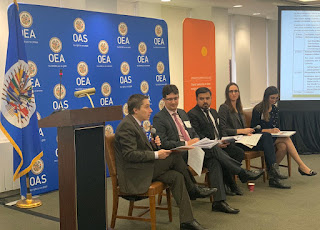The UN Climate Change Conference COP 25 (2 – 13 December 2019), took place under the Presidency of the Government of Chile with logistical support from the Government of Spain. SBSTA 51/ SBI 51 took place on 2-9 December 2019. The pre-sessional period is from 25 November - 1 December 2019. The conference is designed to take the next crucial steps in the UN climate change process. Following agreement on the implementation guidelines of the Paris Agreement at COP 24 in Poland last year, a key objective is to complete several matters with respect to the full operationalization of the Paris Climate Change Agreement... Read more
Interesting Facts
COP25: Stop the climate emergency - and step up investment in adaptation and risk reduction. GNDR members and secretariat staff are attending the yearly United Nations Climate Change Conference on 2-13 December 2019 in Madrid. We’ll be advocating for an increase in funding for resilience building at the local level, and greater involvement of at-risk communities in decision-making. Governments must take action to mitigate climate change by reducing greenhouse gas emissions. But mitigation initiatives can’t be the only solution. We need to adapt to the consequences of climate change and address current and potential loss and damage - not only by transferring the risk via insurance but by taking action to reduce risk ... Read more
Q&A: How to connect the data dots on climate loss and damage. The battle over new funding for disaster damages continues to be divisive as diplomats finished a grueling final week of negotiations at the COP25 climate summit in Madrid. In the lead-up to the yearly UN climate meetings, vulnerable countries and advocates set their sights on securing new commitments on so-called “loss and damage” financing to address mounting damages from climate-linked disasters... Read more
Climate Impacts Require ‘Disaster-Resilient’ Farming - UN. Accelerating climate change impacts mean that farmers around the world need to adopt "disaster-resilient" farming practices to grow adequate food for growing populations. This is a crucial finding of a new report by the United Nations Food and Agriculture Organization (FAO). According to the UN, 91% of all disasters between 1998 and 2017 were caused by floods, storms, droughts, heatwaves, and other extreme weather events. Such events are becoming more frequent and intense and with growing impacts on food security... Read more
Investing in Natural Gas: Options for Resilient and Flexible Power Systems in Latin America. Fossil fuels, especially oil and gas, have fueled global economic development for more than 150 years, and are currently the world's primary energy source. Across the Western Hemisphere, the electricity sector is undergoing rapid change. Natural gas production and consumption are increasing because it serves as a flexible, reliable, and affordable source of power... Read more





No comments:
Post a Comment